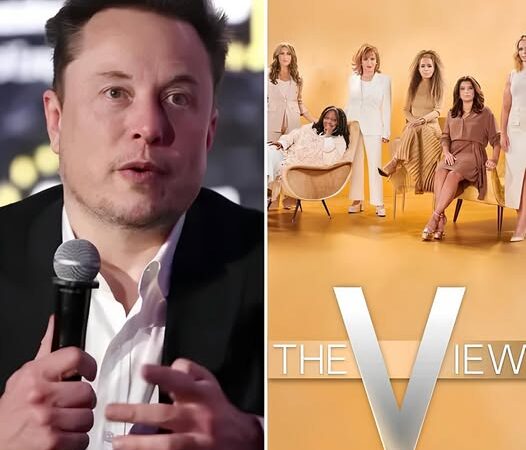Elon Musk, the Chief Executive Officer of Tesla and SpaceX, has once again ignited public discourse with his recent comments. In a provocative statement that has garnered attention from both his advocates and detractors, Musk articulated his intention to boycott the well-known American talk show The View, which he referred to as “a gathering place for ignorant women.” This contentious remark has triggered extensive debate and a surge of activity on social media, prompting inquiries into his perspectives on women, television, and public dialogue. It is essential to examine Musk’s statements, the ensuing reactions, and the broader implications of his words on the cultural and media landscape.
Elon Musk, the Chief Executive Officer of Tesla and SpaceX, has once again ignited public discourse with his recent comments. In a provocative statement that has garnered attention from both his advocates and detractors, Musk articulated his intention to boycott the well-known American talk show The View, which he referred to as “a gathering place for ignorant women.” This contentious remark has triggered extensive debate and a surge of activity on social media, prompting inquiries into his perspectives on women, television, and public dialogue. It is essential to examine Musk’s statements, the ensuing reactions, and the broader implications of his words on the cultural and media landscape.
In a discussion on Twitter, Musk reacted to a remark concerning The View, the well-established daytime talk show recognized for its dynamic panel discussions on contemporary issues, politics, and entertainment. The program, which includes a diverse group of female hosts such as Whoopi Goldberg, Joy Behar, and Sunny Hostin, frequently serves as a venue for debating pressing topics with fervent viewpoints. Nevertheless, Musk’s reply was notably impolite.
Elon Musk tweeted that it is a gathering place for uninformed women, further intensifying allegations from his detractors regarding his propensity for making controversial remarks. This statement was made in reaction to criticism of Musk’s political and social perspectives, which frequently appear to be at odds with those of prominent media figures and left-leaning activists.
Musk’s remarks have understandably attracted significant attention. The tweet rapidly gained traction, igniting a flurry of responses from both his supporters and critics. Proponents of Musk defended his entitlement to voice his thoughts, emphasizing that he was merely exercising the freedom of speech, a principle that has become integral to his public image. They contended that the politically charged discussions on The View could be perceived as biased, and Musk’s irritation was justifiable given the often contentious nature of his views, which are frequently misinterpreted. Conversely, detractors were swift to denounce Musk for his sexist and derogatory language. Many expressed outrage over his word choice, accusing him of undermining and disrespecting women in a context intended to empower them. Feminist organizations, media figures, and various notable individuals articulated their disapproval, advocating for a boycott of Musk’s enterprises and criticizing his decision to target an all-female panel with such disparaging remarks. In an era where gender equality and respect for diverse perspectives are pivotal to social movements, Musk’s comments seem to have resonated deeply. The tweet, perceived by many as an affront to the intelligence and voices of women in the media, has prompted calls for enhanced civility and respect in public discussions.
Elon Musk’s interactions with the media have historically been fraught with tension. As one of the wealthiest and most influential figures globally, Musk has frequently found himself at odds with journalists and public personalities, particularly when they critique his businesses or his viewpoints on various matters. He has consistently utilized Twitter as a medium to express his thoughts, often without consideration for potential repercussions. His remarks tend to incite controversy, yet they also garner significant attention, a skill Musk has adeptly honed over time.
His ongoing disputes with major media organizations, such as the New York Times and CNN, are well established. Musk has repeatedly accused journalists of exhibiting bias and dishonesty, urging his followers to disregard conventional media in favor of more independent sources. The friction between Musk and prominent media entities is not a recent development; however, his latest remarks on The View seem to signify an intensification of his contempt for certain aspects of the media landscape.
The View has been a significant fixture in American daytime television since its inception in 1997. The program has offered a platform for women to engage in discussions on a wide array of subjects, from politics to popular culture, often characterized by strong opinions and vigorous debates. The panelists, representing a variety of backgrounds and political viewpoints, frequently partake in dialogues that are both entertaining and thought-provoking.
The program has faced criticism for its perceived partiality, especially in recent years, with some viewers asserting that the discussions tend to be one-sided or that certain political perspectives are insufficiently represented. This has resulted in a division among the audience: while some commend the show for its courageous handling of contentious subjects, others, including Musk, contend that it frequently endorses a limited worldview.
Musk’s critique of The View seems to arise from his discontent with the manner in which the show tackles issues that resonate with his political and social beliefs. Known for his libertarian-leaning ideology and unconventional business practices, Musk has frequently voiced his dissatisfaction with what he perceives as media bias, particularly from traditional outlets that lean to the left. He views The View as emblematic of a larger trend in media that he believes fails to align with reality.
Musk’s remarks are likely to influence his public persona. As a prominent business leader with considerable influence, he commands a substantial following; however, his contentious statements have also attracted criticism from various sources. While his supporters may remain loyal, such comments could potentially alienate prospective customers, investors, and even employees who perceive his views as divisive or detrimental.
The event underscores a wider phenomenon where influential public figures leverage their platforms to make audacious, and at times imprudent, remarks in an effort to steer the cultural dialogue. Elon Musk is well-acquainted with this practice, yet his comments on The View may challenge the limits of what many deem appropriate in public discussions.
Musk’s remarks on The View have ignited a significant debate, prompting both supporters and detractors to express their views across social media and other forums. While his advocates uphold his entitlement to free expression, critics argue that he reinforces damaging stereotypes and shows a lack of respect towards women. As the situation develops, it is evident that Musk’s interactions with the media, especially programs like The View, will remain under close examination. Regardless of individual perspectives, Musk’s statements highlight the influence and accountability that accompany prominence in the digital era.



